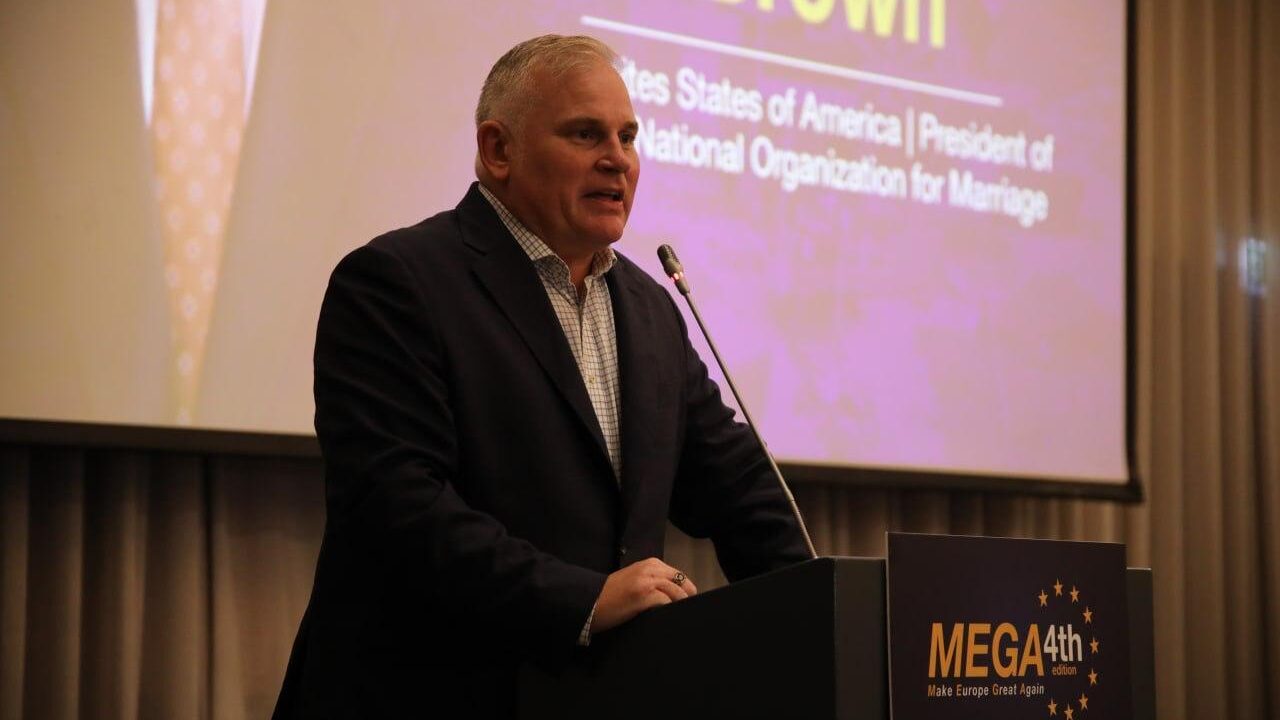Brian Stephen Brown is a well-known American conservative activist. Co-founder of the National Organization for Marriage (NOM), he has been its president since 2010 and also chairs the World Congress of Families. This activism has led him to participate in different international events, in fact, we met in Madrid during the summit of the ‘Political Network for Values’ last year, and we have met again in Bucharest and now in Chişinǎu, capital of Moldova.
This was not Brown’s first time in Moldova. In September 2018, he participated in the XII World Congress of Families held in Chişinǎu and revisited the country because of his good relationship with former Moldovan President Igor Dodon. However, this time the situation was very different. Brown arrived at Chişinǎu airport on Sunday, July 26th to participate in the MEGA ‘Make Europe Great Again’ conference, but the Moldovan authorities banned him from entering the country. “It seems they have decided that they don’t want me here because I am coming to participate in a MEGA conference and because I am a world-known conservative activist,” Brown said from his X account while waiting in an airport lounge.
Brown was not the only one to experience this situation; Czech MEP Ondřej Dostál, Dimos Thanasoulas, spokesman of the Greek NIKI party, and Flemish politician Filip Dewinter were arrested and expelled from the country. By land, the conference’s audiovisual team coming from Bucharest was stopped at the border and forced to turn back.
The border police gave Brown a document to sign noting that “an alert was instituted on the national watch list regarding the prohibition of entry to the territory of the Republic of Moldova” and that the reason for the prohibition was because of a “threat to public order and national security.” He was then told that he would be provided with a plane ticket to his home airport but was eventually informed that he had to purchase his ticket on his own. As there were no more flights, Brown had to stay overnight in the hold lounge at the airport:
It really amazes me that, in this day and age, a country, especially one that is trying to join the European Union, can suppress freedom of speech to such an extent. If someone like me is banned in the Republic of Moldova, I, who organized an important World Congress of Families here not so long ago, and I am a friend of this country. … Well, it seems that this happens if you are conservative and some influential people in Moldova don’t like you.
On the morning of the 27th, Brown missed a first return flight for which he had purchased the ticket because no one came to pick him up to take him to the plane. “Moldova used to be a friendly country to the United States, but we see how it treats a U.S. citizen. I have already contacted the embassy and people at the Secretary of State because this is totally absurd; I have done nothing wrong.”
Finally, after acquiring a new ticket, Brown was able to board the plane. However, it seems that the pressure had an effect and the Moldovan authorities changed their mind; Brown was not a “threat to national security”: “I was already on the plane and was getting ready to take off when the border police showed up and let me off. They said they made a mistake and accepted me,” Brown wrote on X, thanking the U.S. Embassy in Chişinǎu for the support he received and “for taking the time to help.”
Once at the conference, Brown was able to give his speech and recount all that had happened. “It is insane,” he said, “and it is proof of the authoritarianism of the left, which JD Vance denounced in Munich, and of the supposedly liberal, rather illiberal government of Maia Sandu.” He also expressed his surprise that “members of the European Parliament and other European leaders have been denied entry to the country. I am glad that I was able to meet all of them and I sincerely regret what they endured and that they cannot participate in this event.”
For its part, the Information and Security Service of the Republic of Moldova (SIS) provided explanations for the entry ban applied to several foreign politicians. For the SIS, the event had shady organizers, with no transparency of funding and dubious criminal links. “On the basis of information, some participants and organizers aim to promote an extremist agenda, to undermine the territorial integrity and democracy of the Republic of Moldova,” noted the SIS statement, which also mentioned that one of the participants (the conference had 150 attendees) is “a faithful supporter of Russia’s occupation of territories that do not belong to it.” Several Moldovan media also accused Brown of being financed by the Kremlin.
Brown announced legal action against the media that have spread these accusations and denounced the decisions based on defamations of President Sandu and the SIS as a serious mistake that can undermine bilateral relations between Moldova and the United States: “Soviet-style attacks on freedom of association and freedom of speech have no place in free countries”.
Brown is right, you cannot permanently talk about democracy while acting in a totalitarian way. We are witnessing an increasing use of censorship and finger-pointing in the name of freedom for anyone who does not follow the progressive dictates of Brussels. One of the most recent and absurd cases is that of the new president of Poland, the conservative Karol Nawrocki, who during the election campaign was accused of being a “pro-Russian”—despite being wanted in Russia and having received death threats for his work as head of the National Institute of Memory and for having dismantled Soviet monuments in Poland. The Brown case reminds us that freedom is preached by example. Ursula, Maia, and many others should remember it.
